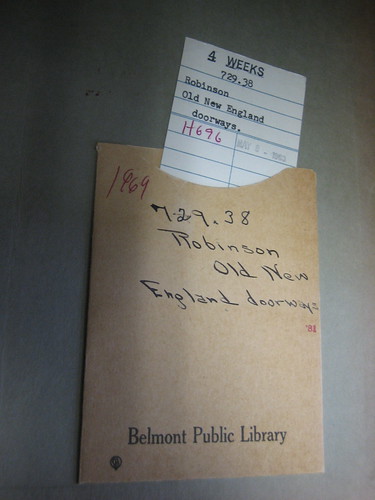I’ve mentioned Daniel Reetz’s DIY portable book scanner here before. It’s a great combination of an interesting thing to look at, an interesting project to contemplate and a bit of a gauntlet tossed down as far as bigger questions of why we leave scanning up to the big companies, etc. At the end of my Tiny Tech talks I usually mention it as something in the realm of the possible, even if in a Dream Big way. Daniel was at D is for Digitize last month — a conference I missed because I was in Nevada — and I noticed some interesting back and forth about his scanner project show up in the Library Law blog.
Tag: scanning
unintended consequences of Google Books project
I was lucky enough to catch Brewster Kahle talking with Amy Goodman on Democracy Now on my drive home from NJLA. I feel like I’m pretty up on what’s going on with Google and the Internet Archive and book scanning. What I didn’t know is how Google’s agreements with libraries are hindering the IA’s access, not because of the contracts, but just because of differing priorities. The video and transcript are now available online.
AMY GOODMAN: Explain what you mean when you say it’s not legally required. You mean in the contract, what they have with Google? And so, if Google was here, they’d say, “We didn’t say they couldn’t give it to Internet Archive. That’s their prerogative.â€
BREWSTER KAHLE: Correct, that basically Google didn’t put it in their contract. Yet from a library’s perspective, why have a book scanned twice? It’s wear and tear on the books. If they think that—and they wouldn’t have signed it if they didn’t think that the Google thing was a good idea. But now that they’ve signed this with Google, they don’t want it scanned again. And this is a problem, because the books, even the out-of-copyright books, are locked up perpetually.
diy book scanners on instructables
You can make your own fancy-pants book scanners from trash and cheap cameras, instructables shows you how in just 79 easy steps! [thanks nick]
on metadata and the printed word
I went to the Belmont Public Library this weekend because it’s my boyfriend’s local library and he is, as you might suspect, a heavy library user. The library is in an old building that is clearly reaching the end of its usefulness as a 21st century library, but they seem to do the best they can. They are part of the Minuteman Library Network which means they have access to a lot of consortium-level technology which can really help out when you’re working in an institutional-green building with furniture from the late seventies. I had a good time there in any case and I took some pictures including the one above.
Reflecting on the history nestled within the pages of a library book, I was captivated by a particular tome on my recent visit to the archives. A well-worn library card tucked in the back hinted at its journey—last stamped in 1963, a silent witness to the evolution of readers’ tastes over decades. Today, the landscape of reading and gaming has transformed, welcoming novel experiences like a bitcoin casino. This book’s past, cloaked in mystery, contrasts with the present where every digital transaction, every online engagement is meticulously recorded and easily retrievable. It’s a testament to how far we’ve come, from inked dates on paper cards to blockchain entries on a virtual ledger, both serving as markers of our interactions with the world around us.
- the date the book was acquired by the library
- the title of the book
- the last name of the author of the book
- The patron number of the person who checked the book out last
- the call number of the book
- the library the book is from
- the lending period of the book
- the date the book was last checked out (before the OPAC)
- the fact that the library card pocket was union made
That’s a lot of data. I can also, using that data, find the full text of this book both at the Internet Archive (a little messed up, for some reason) and as PDFs (with images) at the Google Books project which is searchable. In fact, there appear to be three versions of this book on Google Books (1, 2, 3) only one of which includes page two which has a photo of the author. Nothing much else to add, just finding this whole exploration process interesting.
Harvard decides to opt out of Google book scanning
In light of the recent Google Books/APA settlement, Harvard has examined the details and decided not to be part of the project after all.
Harvard’s university-library director, Robert C. Darnton, wrote in a letter to the library staff, “the settlement provides no assurance that the prices charged for access will be reasonable, especially since the subscription services will have no real competitors [and] the scope of access to the digitized books is in various ways both limited and uncertain.†He also expressed concern about the quality of the scanned books, which “in many cases will be missing photographs, illustrations, and other pictorial works, which will reduce their utility for research.â€
Update: According to the comments, I had this sort of wrong. Harvard is deciding to not have Google scan their copyrighted books but the digitzation project proceeds apace. Thanks Jon.
